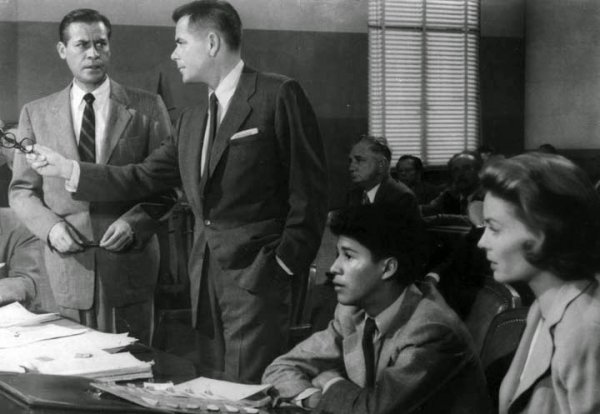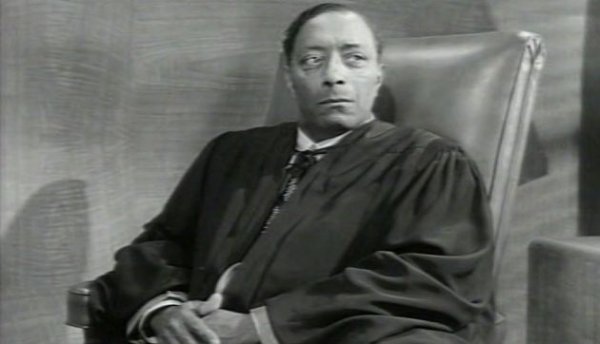- Messages
- 17,444
- Location
- New York City

Trial from 1955 with Glenn Ford, Dorothy McGuire, Author Kennedy and Juano Hernandez
A movie that starts out as a progressive-for-the-era look at racial prejudice through the common device of the trial of a young minority - a Mexican boy, in this case - accused of murdering a young white girl morphs pretty aggressively into a story about the communist party in America cynically using the trial as a fundraiser and moral cause celebre to advance its objective of a global communist revolution.
Holy cow, but yes, that's the plot and while overwrought, it does a darn good job of showing almost everyone in a mendacious light. That list starts with many of the "good" white townspeople who want the "Mex" lynched - "hey, we all know he's guilty, so let's just do it." Thwarting them are an idealistic law professor, Ford, "summering" as a practicing lawyer, the firm's senior partner, Kennedy, and their paralegal, McGuire.
At this point, it's a pretty by-the-numbers legal drama challenging America's justice system to live up to its own ideals when everyone knows the outcome they want ahead of time. And because the senior partner wants to travel across the country to raise funds for the trial, he turns the courtroom defense over to the newbie law professor.
Initially, this move kinda makes sense as the Mexican boy's family has no money and robust defense cases are expensive. But when Ford is called away from his case preparation by Kennedy as Kennedy "needs" him to speak at a fundraiser, Ford is all but tricked into speaking at a communist rally - yes, to raise money for the defense, but also in support of "the communist cause."
He's no communist, so disgusted, Ford returns to his case preparations, but is issued a subpoena by The House Un-American Activities Committee. Now, paralegal McGuire, who we learn once dabbled in communism in college and helped Kennedy in his radical efforts for years, explains the real game to Ford: Kennedy is a true-believer communist who is using the Mexican boy's plight as a massive fundraiser for communism (with only a small amount of the proceeds going to the defense).
At this point, you need to regulate your breathing just to keep up with all the big-issue bombshells falling, but you don't get a chance as the trial begins in this white town itching for a conviction presided over by, hold on, a black trial judge, Juano Hernandez. Seriously, writer Don Mankiewicz and director Mark Robson somehow decided they could boil a full ocean of social issues in an hour and forty-five minutes.
After the usual trial machinations - juror bias (against the Mexican boy) exposed, tendentious testimony (against the Mexican boy) debunked, "objection" screamed a million times - Ford is about to rest for the defense in a case that looks good, at this point, for his client, the young Mexican boy. But in swoops Kennedy (he's still the lead defense attorney) who, sensing the Mexican boy will be found innocent, overrules Ford and puts the kid on the stand - wait, what? Why is Kennedy undermining his own case?
Once again, it is McGuire who explains that Kennedy wants the kid convicted as he can then milk the boy's "martyr" status for more money for the communist party - the kid be damned. (Spoiler alert) After the boy is overwhelmed on the stand by the prosecuting attorney (the exact reason why Ford didn't want to put the boy on the stand), a guilty verdict is handed down and the movie ramps up again.
(More spoiler alerts) Ford, now fuming with indignation, pulls some post-conviction-but-pre-sentencing legal machination to get the boy, a minor, off with, effectively, a slap on the wrist, which will undermine Kennedy's fund-raising-martyr strategy. This move pits Kennedy against the judge where Kennedy viciously tries to goad the black judge to overreact by accusing him of racial bias. Kennedy is angling for a mistrial - as noted, Mankiewicz and Robson have no fear that they can't manage every explosive social issue in America, at this time, in one movie.
(And even more spoilers - a lot happens in this movie) Judge Hernandez (see the postscript) doesn't take the bait and hands down a light sentence. Now victorious and clearly no communist stooge, the chairman of the House Un-American Activities Committee, effectively, drops his subpoena of Ford as, it's explained, the smarmy Chairman only wants easy targets he can use to advance his political career.
Okay, so let's go to the scoreboard. The "good" white people of the town wanted to lynch a Mexican boy. The liberal lawyer who took the case pro-bono turns out to be a communist cynically using the trial to advance the party's objectives in America. He and the party actually want the boy given the death sentence so that they can use his death as a cause celebre for fundraising. And the chairman of the House Un-American Activities Committee is revealed to be a cynical political opportunist wrapping himself in the flag only for his own career gain.
One the plus side, though, an idealistic law professor and a black trial judge (in 1950s America) were able to leverage the philosophical ideals of justice embedded in the American legal system to prevent a complete travesty. There is, believe it or not, more - a love triangle between Kennedy, Ford and McGuire, cohabitation without marriage (again, in the '50s) and the Mexican boy's mother's complex motives - but you now have the big picture in this insanely ambitious movie.
P.S., Juano Hernandez is possibly the most-talented "unknown" actor of the era. As a black man, he sadly wasn't given the opportunity to be the leading man he should have been, but his performances have such nuance and integrity that each Hernandez effort leaves an impression. Beside his incredible work in this movie, see him elevate every scene he's in, in Young Man with a Horn and The Breaking Point.





